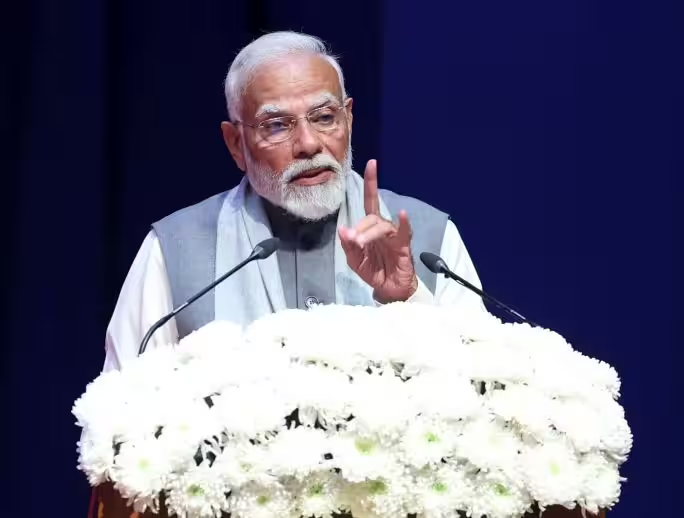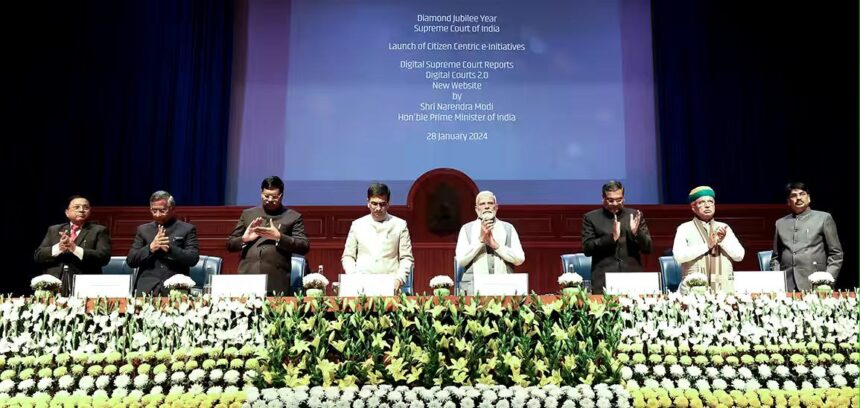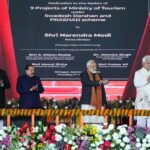New Delhi: Prime Minister Narendra Modi inaugurated the Diamond Jubilee celebration of the Supreme Court of India on 28 January.
Prime Minister Narendra Modi inaugurated the Diamond Jubilee celebration of the Supreme Court of India on at the Supreme Court auditorium in Delhi. He also launched citizen-centric information and technology initiatives that include Digital Supreme Court Reports (Digi SCR), Digital Courts 2.0 and a new website of the Supreme Court.
The Digital Supreme Court Reports (SCR) will make Supreme Court judgments available to the citizens of the country free of cost and in electronic format. The key features of digital SCR are that all 519 volumes of the Supreme Court reports since 1950, covering 36,308 cases, shall be available in a digital format, bookmarked, user-friendly, and with open access.
Digital Courts 2.0 application is a recent initiative under the e-Courts project to make court records available to the Judges of the district courts in electronic form. This is coupled with the use of artificial intelligence (AI) for transcribing speech to text on a real-time basis.
The PM Narendra Modi also launched the new website of the Supreme Court. The new website will be in bilingual format in English and Hindi and has been redesigned with a user-friendly interface.

PM Narendra Modi Addressing the gathering:
Addressing the gathering, the PM Narendra Modi congratulated everyone and expressed gratitude for being present when the Supreme Court of India is marking the beginning of its 75th year today and also mentioned the Constitution of India entering its 75th year.
The Supreme Court has strengthened India's vibrant democracy. pic.twitter.com/hbxJ5pKKeh
— PMO India (@PMOIndia) January 28, 2024
The PM Narendra Modi said that the makers of the Indian constitution saw the dream of a free India based on freedom, equality and justice and the Supreme Court has continuously tried to preserve these principles. The Prime Minister said that “Whether it is freedom of expression, personal freedom or social justice, the Supreme Court has strengthened India’s vibrant democracy.” The Prime Minister noted the milestone judgments on individual rights and freedom of speech that have given a new direction to the nation’s socio-political environment.
PM Narendra Modi reiterated the parameters of goals for the next 25 years for every branch of the government and said that today’s economic policies will form the basis of tomorrow’s vibrant India. “Laws that are being laid down today will strengthen the bright future of India”, PM Narendra Modi said.

PM Narendra Modi highlighted the government’s initiatives in abolishing outdated colonial criminal laws and introducing new legislation such as the Bhartiya Nagrik Suraksha Samhita, Bhartiya Nyaya Samhita, and Bhartiya Sakshya Adhiniyam. He emphasized, “Through these changes, our legal, policing, and investigative systems have entered a new era.” Emphasizing the significance of transitioning from centuries-old laws to new statutes.
PM Narendra Modi stressed, “The transition from old laws to new ones should be seamless, which is imperative.” In this regard, he noted the commencement of training and capacity-building initiatives for government officials to facilitate the transition. Prime Minister Modi urged the Supreme Court to also engage in capacity-building for all stakeholders.







